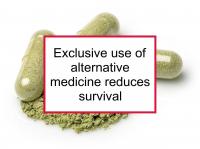Alternative medicine refers to unconventional treatment that is used instead of mainstream medical treatment. Complementary medicine refers to therapies or practices used alongside conventional medicine. The outcomes of alternative medicine for breast cancer are not well studied, but no successful alternative treatments have emerged.
In fact, there is no documentation of life-prolonging or curing effect of alternative medicine in breast cancer, although some complementary treatments can relieve symptoms or increase quality of life. Now a new study has reported that complementary and alternative treatments do not change the outcomes of breast cancer.
Where are the alternative medicine studies?
Studies that rigorously compare alternative to conventional medical treatment for breast cancer are nonexistent. This is in part because responsible researchers would be reluctant to attempt a study in which standard medical treatment is given to one set of breast cancer patients while only alternative medicine is administered to a similar group of patients for comparison.
There have been serious proponents and practitioners of alternative medicine who have claimed cancer cures since the first half of the last century. There exist alternative treatment centers and many individual health practitioners who make alternative treatments such as the raw food diet the centerpiece of their breast cancer treatment regimens. Where are the studies documenting their treatment outcomes?
Alternative medicine proponents would probably argue that they get more hopeless cases who are least likely to survive, so that it is unfair to judge their performance by their many failures. However, at the very least, women who have refused conventional medical treatment and chosen an alternative approach could be matched and compared retrospectively with a similar set of women who received standard treatment.
This would require data concerning breast cancer type, stage, and other prognostic factors. Such data could be collected readily concerning patients at conventional cancer centers, but it is not clear that the records kept by those treating breast cancer with alternative treatments are of the required quality. Nevertheless, such a study could provide potentially useful information.
In addition, alternative practitioners are in a position to observe which patients benefit most from their treatments, even if they do get a lot of patients with a poor prognosis. Suppose there is a small group that tends to have longer remissions than others. What are their characteristics? However, if such data has been collected, it has not been shared, possibly because alternative treatment advocates wish to present their methods as effective treatment for every type of breast cancer.
No outcome benefits for complementary and alternative medicine
The study referenced at the beginning of this news article was designed to investigate whether use of complementary and alternative medicine (CAM) influences breast cancer prognosis in women who do not receive systemic therapy (typically, chemotherapy, trastuzumab (Herceptin) and/or endocrine treatment). To conduct the study, the authors analyzed data from the Women's Healthy Eating and Living (WHEL) study. A total of 2,562 breast cancer survivors who participated in the study completed baseline assessments and a questionnaire concerning use of CAM. The women were followed for an average of 7.3 years.
Women who did not receive any systemic treatment were found to have 1.9 times the risk of recurrence and 1.7 times the risk of death during follow up as those who had received such treatment. Considering only the 177 women who did not receive systemic treatment, use of CAM was not found to be related to breast cancer relapse. In other words, CAM did not appear to prevent or cause recurrence. No significant differences in relapse rates were found between high supplement users (at least three supplements per day) and low supplement users.
The authors conclude that the risk of breast cancer relapse and death was higher among women who did not receive any systemic treatments — the use of dietary supplements or complementary and alternative medicine therapies did not change this risk. The authors further comment that complementary and alternative therapies should not be used in place of standard treatment.
Please see our articles on whether food can cure cancer and the raw food diet for more information.
